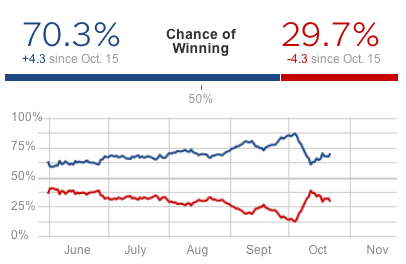They Can't Both Be Right: 'Savvy' Experts vs. Polls
After the first presidential debate, opinion polls showed what most "analysts" were also saying: that Mitt Romney had done well, Barack Obama had done poorly, and what had seemed an insuperable Obama lead was shrinking by the day.
Since the second debate, and especially in the past three days, Republican commentators have been saying what the polls are not showing: that Romney has "momentum," that he's on an unstoppable roll, that their side is getting ready for an inevitable win. Anyone who has watched Fox, been on Republican email lists, or followed even "mainstream" "savvy" commentary has seen this shift. Michael Tomasky talks about this tone taking over the press "narrative" here.
Meanwhile, this is what the most-frequently-cited poll-of-polls, from Nate Silver at FiveThirtyEight, has shown during very same period. Obama's re-election probability is shown in blue.

The big drop in Obama's probability-of-win*, from a high of 86% to a low of 61% by Silver's calculation, came immediately after that first debate. But a week later, that decline stopped -- and then reversed, as it has through the subsequent ten days. (Similarly, see Votamatic.org. Eg, "The reality in the states - regardless of how close the national polls may make the election seem - is that Obama is in the lead.")
They can't both be right: on the one side, the Republican partisans and political "pros" who say that Romney is on the certain road to victory, and on the other the quants who say No he is not. Of course either side allows for uncertainty about the final outcome: there are still two weeks to go. But about the state and the trend of the race, at this moment, they are in fundamental disagreement. The "pros" tell us that Romney is catching up, the quants say he is falling behind.
In a way this is a perfect test case of the Michael Lewis Moneyball hypothesis. Apart from Silver's own background as a sports-stats analyst, we have an exceptionally clear instance of people judging from their experience, their "bones," their personal instinct, etc that things are going one way (like veteran scouts saying that a prospect "looks like a Big Leaguer"), while data (on-base efficiencies in one case, swing-state polls in another) point in the opposite direction.
I don't know who's right, but I note this as a moment of unusual clarity about two approaches to politics. Among the many things we'll learn two weeks from now (and in the assessment afterwards) is which of these approaches to political analysis has revealed a profound flaw.
____
Update an extremely savvy analyst who is resisting the "momentum" theme: our National Journal colleague Charlie Cook, here. And Jonathan Chait says that the "we're winning!" strategy is a calculated bluff from the Romney side, which is paying off with many journalists. E.g.:
Romney is carefully attempting to project an atmosphere of momentum, in the hopes of winning positive media coverage and, thus, creating a self-fulfilling prophecy....
Obama's lead is narrow -- narrow enough that the polling might well be wrong and Romney could win. But he is leading, his lead is not declining, and the widespread perception that Romney is pulling ahead is Romney's campaign suckering the press corps with a confidence game.
* Note Although this will be obvious to anyone who has visited Silver's site or understands what he is doing, I should probably re-emphasize this point: Saying that Obama has a 70-30 probability of win is entirely different from saying he has a 40 point (70 minus 30) lead in the polls. A 70% win-probability means that on a large volume of statistical-model runs of the election, the results show an Obama victory 70% of the time. But 30% of the time, they show a Romney win. If we were really talking about a 40-point lead in the polls, then the probability of win would be closer to 99.9%.